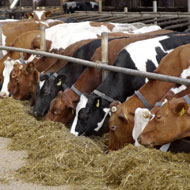Cattle virus linked to breast cancer

BLV is easily transmitted and infects the blood cells and mammary tissue of dairy and beef cattle.
For the first time, scientists have found a link between bovine leukaemia virus (BLV) and breast cancer in humans.
UC Berkeley researchers compared the breast tissue samples of 239 women who either had breast cancer, or had no history of the disease.
Among the breast cancer samples, 59 per cent showed evidence of exposure to BLV - determined by the presence of viral DNA.
Meanwhile, BLV exposure was found in only 29 per cent of the samples from women with no history of breast cancer.
BLV infects the blood cells and mammary tissue of dairy and beef cattle. It is easily transmitted, though it only causes disease in less than 5 per cent of infected animals.
Last year, a study led by UC Berkeley's Gertrude Buehring, overturned the long-held belief that BLV could not be transmitted to humans.
But the paper published in PLOS ONE this month takes the findings further. When researchers analysed the data statistically, they found breast cancer was 3.1 times more likely if BLV were present.
"This odds ratio is higher than any of the frequently publicised risk factors for breast cancer, such as obesity, alcohol consumption and use of post-menopausal hormones," said Prof Buehring.
While this is an important first step, she stressed that these findings do not prove BLV causes cancer.
"We still need to confirm that the infection with the virus happened before, not after, breast cancer developed, and if so, how."
If BLV were proven to be the cause of cancer, however, it could completely change the way the disease is fought, shifting the focus to prevention rather than cure or control.



 The veterinary mental health charity Vetlife is inviting the veterinary community to join it for a sponsored cold-water dip.
The veterinary mental health charity Vetlife is inviting the veterinary community to join it for a sponsored cold-water dip.